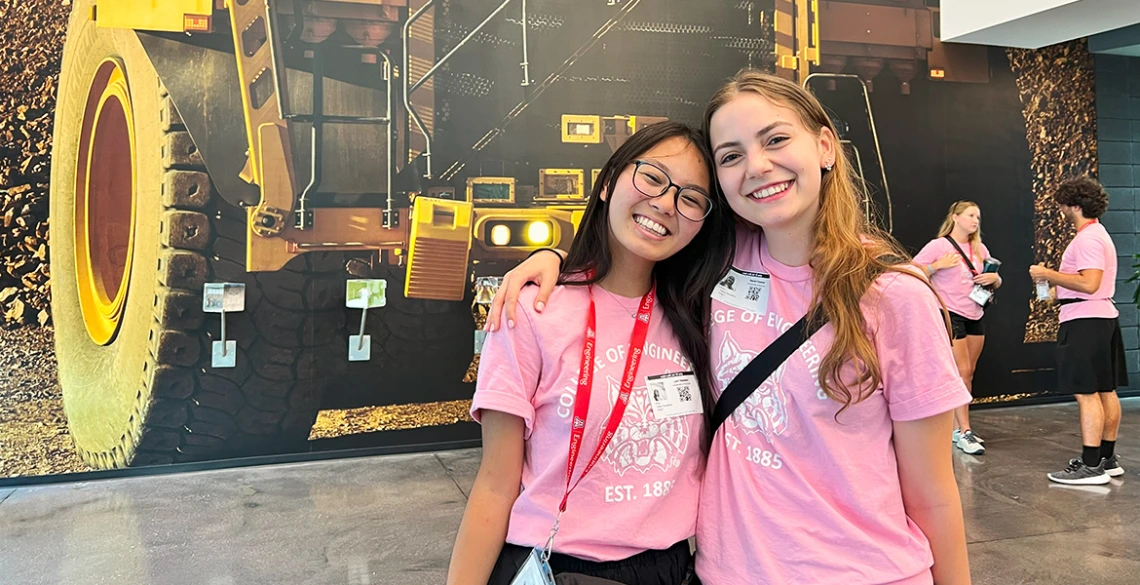Summer engineering camp triples in size, expands access
High school students enjoy hands-on activities highlighting careers at the intersection of engineering and sustainability.

Summer Engineering Academy counselors Lumi Hissataka, an optical sciences and engineering major, and Rachel Foreman, a software engineering major, help guide students along the Caterpillar tour.
When Cori Dennis arrived at the University of Arizona College of Engineering last fall, the high school outreach and summer programs coordinator saw a big opportunity.
The Arizona Summer Engineering Academy had bounced back after an expected pandemic-era dip. But there was still massive room for growth.
With that in mind, the academy began offering new design and build activities, overnight camping, and insider access to industry leaders. SEA was already the college’s largest summer camp, but thanks to this new direction, total enrollment nearly tripled this year from 120 to 353 – the highest attendance in the program’s 22-year history.
Dennis also prioritized greater access, making the program affordable for even more students across the United States. Students from Arizona, California, Texas, Colorado, Illinois, New Jersey and North Carolina attended.
“I've cut the cost,” she said. “I worked with industry partners to gain more scholarship opportunities. We have 45 students on scholarship.”
Partners like Bosch, Intel and Caterpillar were integral to Dennis’ expansion goals, providing scholarships and facility tours. Cummings Aerospace also fully supported the middle school version of SEA. With their help, 100 young engineers attended at no cost.
“This group of kids is amazing,” Dennis said about this year’s middle school cohort. “They did a lot of coding using Python. They were able to code robots, and then had a robotics competition.”
Connecting engineering to the environment
While the middle school students refined their coding skills, high school campers accessed a wide range of engineering fields. All 10 of the college’s departments participated in SEA programming.
During the Women in Engineering camp on June 19, civil and architectural engineering and mechanics assistant professor Hee-Jeong Kim introduced students to sustainability in everyday materials.
“Concrete is the second most widely used material in the world, after water,” Kim said. “As civil engineers, we have the potential to address major challenges like climate change by making sustainable concrete.”
Students created their own concrete samples with materials pioneered in Kim’s M2D lab, then experimented with 3D-printing software.
“The most important thing for high school students to know about civil engineering is that it is not just about building structures. It involves designing sustainable and resilient infrastructure that improves the quality of life for people and protects natural resources,” Kim said.
Unforgettable industry experiences
The Experience Engineering Overnight Camp students were treated to a tour of Caterpillar’s newest mining division office in Tucson on July 10. Campers marveled at touchscreen tabletops and a life-size off-highway truck mural, as data analyst Kasey Spradling guided them through the facilities.
Spradling graduated from the U of A in 2023 with a bachelor’s in engineering management and a minor in industrial engineering. Caterpillar snatched her up quickly after an internship and capstone project with the company.
“I still remember my capstone number,” she said. Team 23023 won the TRAX International Award for Best Implementation of Agile Methodology for its Large Tractor Ladder Latch Design.
During the visit, she showed students the ultramodern makerspace and virtual reality lab where Caterpillar engineers dream up new construction equipment.
“(Engineers) can design a part within CAD systems, implement it in a virtual environment and test it on the equipment, without it ever actually being made,” she explained. “Or they can utilize the makerspace to develop their designs in a real-life environment before its produced at a large scale.”
The tour ended with a career panel led by another proud alum.
Nitin Patel is a former SEA counselor himself and a 2002 mechanical engineering graduate. With a 20-year career at Caterpillar, he is always eager to engage with the next generation of engineers.
“When you are thinking about what you want to do for the world, engineers solve global problems,” Patel told the students. “Bright minds like yours are what the field of engineering needs.”
Patel and camp coordinator Dennis unveiled a major surprise at the end of the panel, when they announced that four SEA students would receive scholarships from Caterpillar.
Adrian Bin was one of those lucky students. The senior from Riverside, California, was ecstatic to win and grateful for his time at the academy.
“I didn’t expect how much this experience could offer in just a week, especially with all the counselors,” he said. “You really get guided in the right direction here.”
Meanwhile, SEA helped Tucson high school junior Xochitl Edgecombe discover a potential career.
“I’ve learned so much I didn’t know before,” she said. “I grouped engineering as a whole, but now I know each engineer has their own job. Biomedical research is so cool.”

